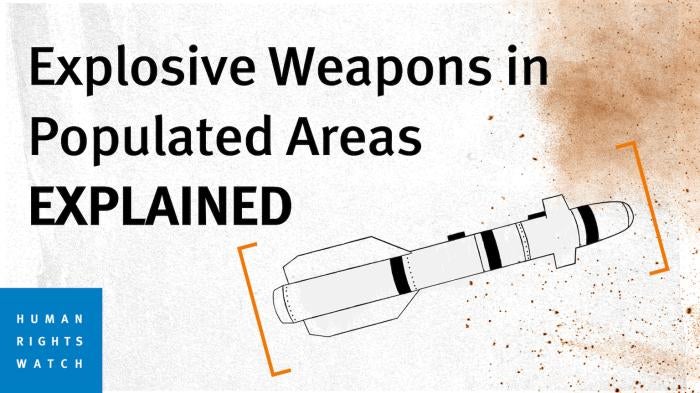Governments should act on recent political commitments to protect civilians from the bombing and shelling that devastates cities and towns around the world, Human Rights Watch said today in a report issued with Harvard Law School's International Human Rights Clinic.
The 37-page report, "Strengthening Civilian Protection: Principles for Implementing the Declaration on Explosive Weapons in Populated Areas," introduces seven guiding principles to help countries that have endorsed the Political Declaration on the Use of Explosive Weapons in Populated Area put their commitments into practice. Civilians make up the vast majority of casualties caused by the use of explosive weapons-such as aerial bombs, rockets, missiles, and artillery and mortar projectiles-in populated areas. Explosive weapons also turn urban areas into rubble, destroy infrastructure, and damage the environment and cultural heritage.
"Countries at war that use explosive weapons in populated areas kill, injure, and traumatize civilians, disrupt access to essential services, and cause mass displacement," said Bonnie Docherty, senior arms adviser at Human Rights Watch; lecturer on law at the Harvard Clinic; and lead author of the report. "The extensive harm recently documented in Ukraine, Gaza, Democratic Republic of Congo, and elsewhere shows that governments should intensify efforts to implement their expressed commitments to protect civilians from this method of warfare."

The declaration, adopted in Dublin in 2022, is a nonbinding international instrument that seeks to prevent and remediate the devastating effects on civilians associated with using explosive weapons in cities, towns, and villages. Endorsing countries and other relevant stakeholders will meet in San José, Costa Rica, from November 18 to 20, 2025, for the declaration's second international conference to encourage broader endorsement, review and strengthen implementation efforts, and outline next steps.
The declaration says that countries that endorse it should take a variety of steps to better protect civilians, including "restricting or refraining from" the use of explosive weapons in populated areas and assisting victims of harm that has already occurred. Endorsing countries should also gather and publicly share data about the use and effects of explosive weapons that can be analyzed to learn lessons that improve civilian protection in the future.
Human Rights Watch and the Harvard Human Rights Clinic urge governments to follow seven guiding principles to effectively implement the declaration's commitments. These principles are applicable to all countries, no matter the structure of their government or size of their military.
Countries that have endorsed the declaration should (1) comprehensively address the humanitarian consequences of the use of explosive weapons in populated areas, and (2) develop progressive civilian protection standards that go beyond existing international humanitarian law, Human Rights Watch and the Harvard clinic say in the report. Countries should also (3) collaborate with a wide range of actors; (4) ensure that all decisions are informed by relevant data; and (5) be transparent in implementation efforts. Finally, they should (6) internalize their commitments as part of their national laws and policies and (7) promote the declaration and its norms beyond the endorsing countries.
"Strengthening Civilian Protection" builds on the 2022 report "Safeguarding Civilians: A Humanitarian Interpretation of the Political Declaration on the Use of Explosive Weapons in Populated Areas," co-published by Human Rights Watch and the Harvard Human Rights Clinic, which focuses on interpreting the declaration's provisions.
Human Rights Watch is a co-founder of the International Network on Explosive Weapons (INEW), the coalition of civil society groups that helped drive creation of the declaration. The network and two civil society partners-Fundación para la paz y la democracia (Foundation for Peace and Democracy or FUNPADEM) and Seguridad Humana en América Latina y el Caribe (Latin American Human Security Network or SEHLAC)-will host a Protection Forum, open to all delegates, on the first day of the San José conference.
"Governments that adopt strong measures based on shared principles can help maximize the declaration's potential as a tool for protecting civilians," Docherty said. "They can set standards that influence not only other countries that have endorsed the commitments, but also parties to armed conflict that have yet to do so."






